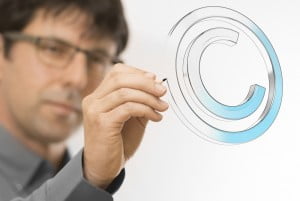August 12, 2015
Categories: Patent and Copyright

You work hard – sometimes for years or decades – to create something new. Your invention might change the world or just improve one small corner of it. Your creative work might lift spirits, change minds, soften hearts, or simply entertain. No matter what you intend to get out of your work, you deserve to pursue and maximize profits from your work without others unlawfully profiting from it, too..
Unfortunately, there are those in the world who might seek to take that security from you. Whether they steal your ideas outright or simply try to limit your ability to do as you please with your work product, protecting your work requires an understanding of patent and copyright law.
Copyright
Copyright applies to original writing, music, art, designs, plays, and other creative works of expression. Under federal copyright law, the author or creator has exclusive rights to his or her work from the moment the work is created. Copyright protection is available whether or not the creator marked the work as copyrighted (i.e. “Copyright John Doe” or “© John Doe”) or whether or not that copyright was registered with the U.S. Copyright Office. Copyrights generally protect a work for 70 years after an author’s death.
Once your work is created, you have the exclusive right to decide whether anyone ever sees it, how much to charge for it, and who else can profit from it. If someone else tries to profit from your work without your permission (often known as plagiarism), copyright can empower you to block their attempt as well as require them to compensate you for any profits they made from your work, plus any damages you suffered as a result of their actions.
If you have been the victim of plagiarism or some other violation of your creative copyright, it can be daunting to get compensation on your own. You will be required to register your copyright before filing a claim for infringement under the federal copyright laws, and you will need to prove not only your copyright, but also the plagiarist’s profits and your damages.
Patents
Patents are registered property rights used by inventors that serve to exclude others from using or profiting from their inventions. Like copyrights, patents have expiration dates, but timeframes for patents are rather more severe: patents will protect your invention for 14 to 20 years, depending on the type of patent you need.
Unlike copyrights, patents do not automatically protect your invention as soon as you invent it. In order to gain the advantage of a patent, an inventor must apply for it, disclosing the invention and listing its distinguishing features that will show that it is actually different from the other inventions already in existence.
Though it is technically possible to invent something and market it – or even provide it for free – without a patent, such a scenario is dangerous. If you do not patent your invention yourself, you leave the door open for some other unscrupulous individual to attempt to patent your invention under their own name, which would then give them the rights to exclude you from using, selling, or otherwise distributing your own invention.
If you have invented something unique, it is best to consult with a qualified patent attorney as soon as possible. You only have a year from the date your intention is first sold in commerceto file for a patent, and the U.S. Patent and Trademark Office has complex requirements for patent applications.
The experienced attorneys at Wagner, McLaughlin & Whittemore can answer your questions about copyright and patent law, and we would be pleased to assist you in applying for either. If your patent or copyright has been infringed, you must act quickly to protect your rights. Contact us today for a free consultation.